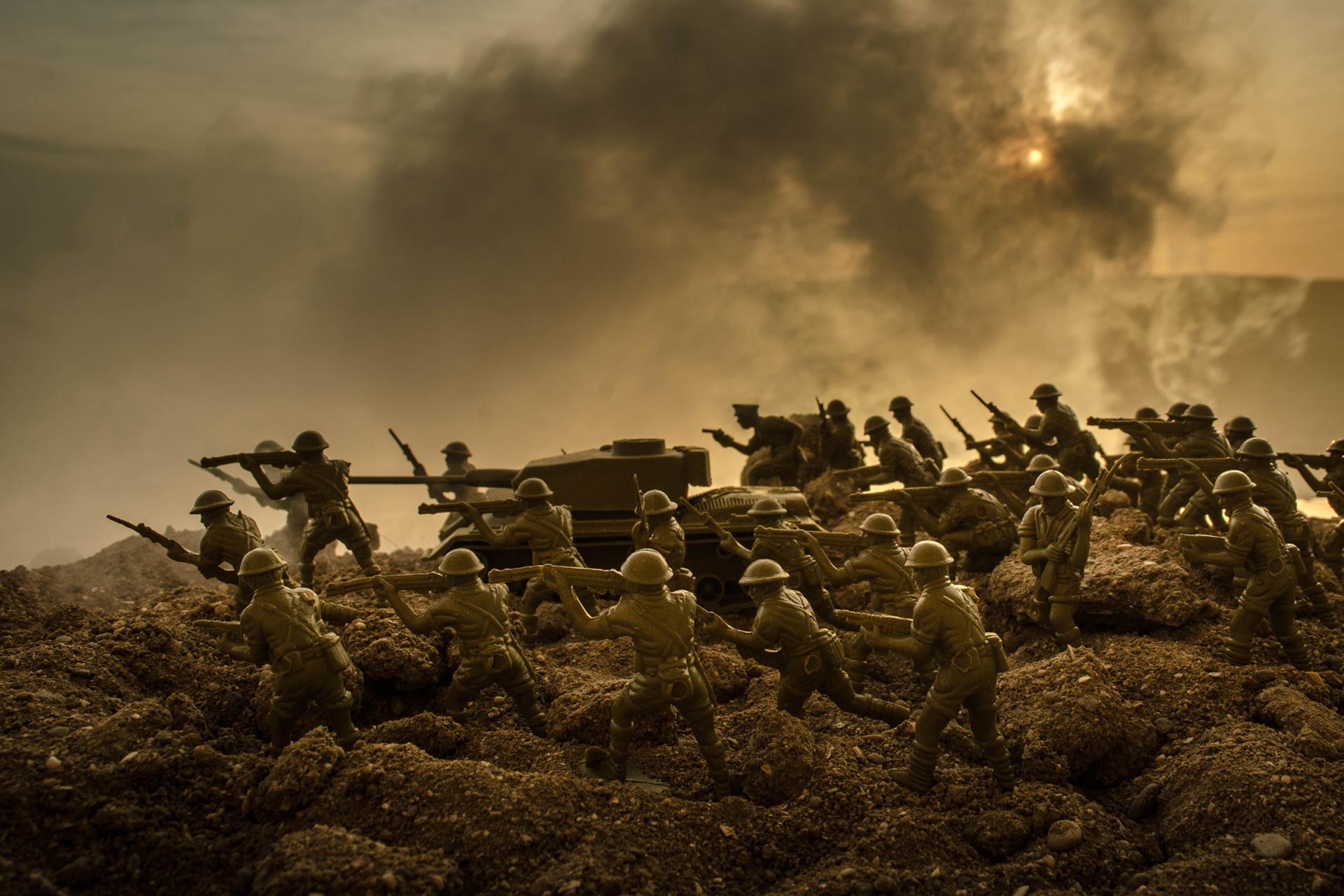
What Did You Do in WW II, Neil Tucker? (Part 1 of 3)
Note: The following is Part 1 of an oral history of Cooper Neil Tucker during WW II, as told to his wife, Rebecca Tucker. Neil was a lifelong resident of Arlington, Texas, and a descendent of Arlington pioneer James Daniel Cooper. Neil passed away April 21, 2010. This document was part of a history assignment while Rebecca was attending Dallas Baptist University during the mid1990s. The assignment was to obtain an oral history of WWII experiences. Neil was nine years old when America entered the war.
Where were vou in November of 1941?
I was almost ten years old, living in Arlington, a small country town - we were just getting over the Depression. It was a very nice time in the U.S. Everyone was getting over the Depression. I am not sure the Depression had very much impact on Arlington, nobody had very much anyway. Of course, I was just a little kid, born in the midst of the Depression, so I did not know any other way of life. I remember Mother was sending me to Aunt Beatty's (Beatrice Short, Arlington school teacher; Short Elementary was named in her honor) regularly to visit. I deducted later she was actually sending me out there so I would be sure to get something to eat - I didn't know that until I was grown.
What were vour parents’ occupations?
During the Depression, Mother was a housewife and Daddy was an accountant. Mother started to work after Daddy joined the Navy when the war broke out. She started to work for her brothers at the Rainbow Grill, a restaurant run by my uncles Howard and Johnny. Bampa (my Grandfather) owned the Cooper Hotel. It was located on Division Street in Arlington (NW corner of Division & Center Streets, now Top Dollar Pawn). She went to work for them in 1942 I guess. My father is the only person I know who served in both World War I and World War II. He was in the Navy in World War I and joined the Navy after World II broke out.
Were you employed during the War?
I mowed lawns and delivered circulars, anything to earn a few pennies. I got 50 cents for mowing a lawn. Later when I went to work for the drug store I drew an hourly wage of let's see, 40 cents an hour, I think. That was about 1945 or 1946; I was in the ninth grade - fourteen at the time.
Did you move from one house to another?
We moved to the big house on Mesquite Street (310 N. Mesquite St.; this house was where the First United Methodist Church’s offices are now located) in 1945 when my Grandfather died. Mother inherited some money and she bought the big house, and a new car. New cars were hard to come by, but she finally talked Bob Cook into selling her a new Ford - a 1946 Ford. They didn't make cars in 1943, 1944, or 1945 because they were making tanks and trucks for the war. So in 1946, when the new cars came out it was hard to buy a car; she talked Bob Cook into finding her one. She had $1,600 cash - so she got a brand new car.
Do you remember any unions or any efforts to unionize? Do you remember any strikes?
No, I don't. All I read about was the war. I kept up with it every day. I would run out and get the newspaper every day and check to see where the arrows were that day. Every day the paper would have a map of Germany and the South Pacific showing where the battles were.
What did you spend money on? Did you Buy Bonds?
We bought war stamps and when all the kids got their stamp books full, we would march down Center Street to the post office. I think it was $18.75 for a book and you could trade that in for a War Bond. I don't think you could buy bonds at the bank; I think you had to go to the post office. Tuesday was stamp day, and all the kids would bring what pennies they had saved during the week and buy war stamps.
On Saturday mornings I would go to the movies. We would also go to Rockyfellers; it was sort of the McDonalds of that time. You could get a hamburger for a nickel and a large Mission Orange for a nickel - which would fill a little guy up. It was 12 cents to get in the movie and a tall sack of popcorn was a nickel. If you saved your sack and took it back, Mrs. Maxwell would fill it up again so it was enough to last you through a double feature; 2 or 3 cartoons; and a "short", you know, like the Three Stooges, Captain Marvel, Superman-that kind of thing.
Do you remember using ration books?
I sure do. I was especially aware of them because Mother had to do all the buying for the restaurant and she had to use ration books. She also had to have a sticker on the car windshield that told how much gas she could have. The ration books or stamps were used for items such as sugar, gasoline, meat, and anything rubber like tires - the things that were used in the war effort. As far as food goes, meat is the thing that sticks out in my mind the most. That was when I first remember margarine; we called it oleo and when it first came out it was a butter substitute - I guess because all the butter was shipped to the soldiers. Feeding all those men was quite a chore, I would guess. Oleo was white and people complained about it so, they started putting in little packets of orange powder that you mixed with the oleo to make it yellow so it would look more like butter. People seemed to accept it better when it was at least somewhat the color of butter.
Did you know about the black market?
I didn't then, but after I was grown I learned about the black market. I doubt there was very much of that going on in Arlington. If there was, my granddad was involved in it somehow, I imagine. I know when Mother was first trying to buy a car, she was asked to give the dealer something under the table, a kickback because cars were so scarce. I don't really remember any black-market in Arlington. There could have been, I don't know.
How did you spend your leisure time? What kind of things did little boys do?
My front yard sloped down to the sidewalk. It was just right to lie on and look at the sky and watch the clouds. I spent a lot of time lying on that front yard watching the clouds go by and thinking about what I was going to be when I grew up. That was when I first realized I was a dreamer. I lived at 305 East Front Street and right in front of my house was a vacant lot and over on the right was the stockyards. I loved the stockyards, the way the hay and the animals smelled. There were always animals to talk to and pet in the stockyards. On the other side of the stockyards was where they stacked the telephone poles, and down on the left was Rogers stock tank. A railroad trestle and the railroad track were on the other side of that. I used to sit on my front porch and when a train would come by I would log the engine number down and count the cars and write down what time it came by and whether it was east bound or west bound. I probably had better records than Texas and Pacific. Anyway I spent a lot of time (it was kind of a poor-boys Six Flags) playing on those telephone poles and playing in the stockyards. My friend Nomi and I spent a lot of time at the tank fishing and just talking. It was a very relaxed atmosphere; we had the run of the town and went anywhere we wanted to go.
Were you afraid of being bombed or anything?
No, my biggest fear was the gypsies, we had to lock up everything when the gypsies came to town. The gypsies always camped in the vacant lot right across the street. Mother would keep us in the house because “gypsies would steal children.” After I was grown and looked back on that I had to laugh. Those gypsies might have stolen a chicken or two, but they had plenty of children of their own to feed. They weren't about to steal any more kids. That's kind of how I spent my days. I enjoyed going down to Luttrell's grocery store and buying a stalk of sugar cane and taking it over and sitting on top of the stockyard fence and watching the animals in the pens while I ate the sugar cane.
How important was the family? The Church? The School?
The family was the focal point - everything was geared around family. The family was extremely important. The church was the center of any social activity, along with the school. That pretty much took care of any time available - the family, the church or the school. That was our life.
